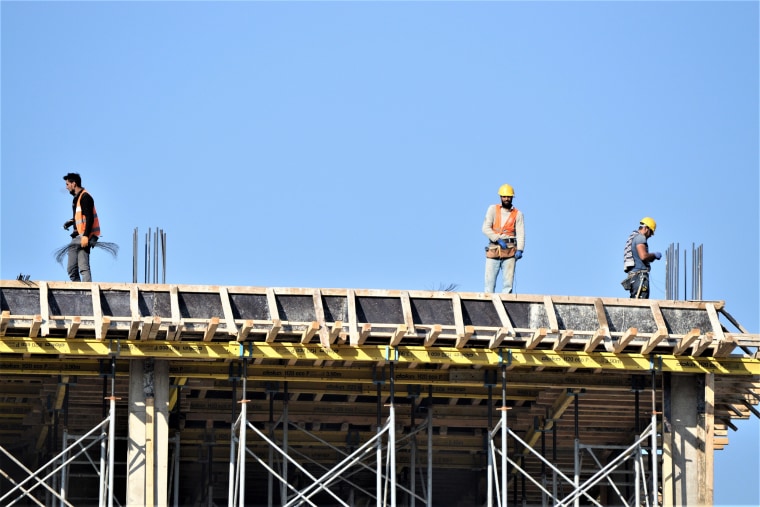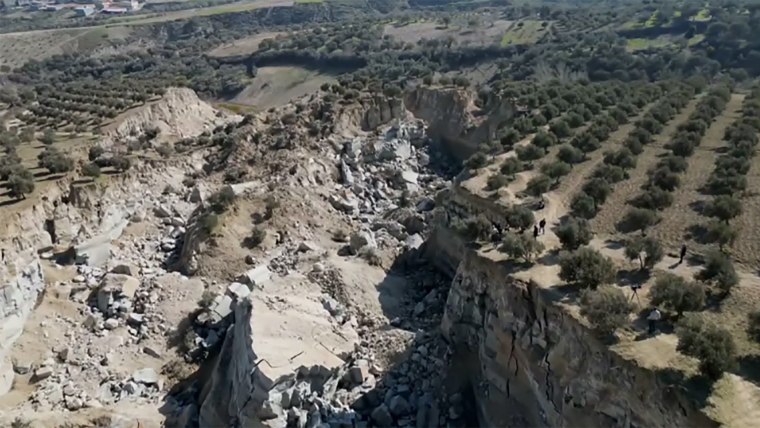[ad_1]
While the Ministry of Justice has arrested more than 170 people —mostly contractors — in connection with the building collapses, many are focusing and casting the blame on the existing building regulations. Of particular note is a 2018 “amnesty” law legalizing hundreds of thousands of structures across the country that did not have planning permission or had disregarded building codes, including earthquake safety measures.
Under the amnesty law, the owner of an unauthorized construction could just pay a fee and have it legalized without any inspection. In other words, according to critics, the new regulation allowed builders to skirt building codes while the government collected fees and fines.
The government collected 23 billion Turkish lira (about $4 billion at the time) after the 2018 legislation went into effect, Murat Kurum, the minister of environment, urbanization and climate change, told parliamentarians in 2019.
“The amnesty is murder,” the Union of Chambers of Turkish Engineers and Architects said in a 2021 statement. “It should be assumed that all buildings legalized under this amnesty have not received any engineering services, and should be inspected,” the organization added.
Professional chambers, which defend the interests of some 650,000 civil engineers, architects and urban planners, play an important role in Turkey, with the Constitution stating that the organizations “function as public institutions” in order to “protect professional discipline and ethics.”
Also in 2021, a parliamentary report found that close to 8 million buildings constructed that year were very vulnerable to earthquakes.
Erdogan, who cultivates a pro-business reputation, campaigned on the amnesty legislation.
At an election rally in 2019 in Hatay, one of the cities that suffered the most damage in the earthquakes, he said, “We built 8,000 residential projects and solved the problems of 205,000 Hatay residents with the amnesty,” a reference to the amnesty granted to unlicensed buildings.
According to Kurum, more than 7 million buildings were legalized thanks to the amnesty.
Turkey’s Ministry of Environment, Urbanization and Climate Change and Erdogan’s office did not respond to requests for comment on this story. On Feb. 8, during a speech in Hatay, Erdogan said it was “not possible to be prepared for a disaster this big.”
Building boom
Turkey’s central government and local municipalities both play a role in shaping cities. The reason the ruling AK Party has come under so much criticism is that it holds most seats in Parliament and can pass critical legislation such as the amnesty. It also controls the public housing authority, which carries out urban development projects.
Local municipalities, some run by the ruling party and some by the opposition, also play a major role, as they are responsible for creating zoning plans that determine building rights, such as deciding which areas are open for construction and imposing floor area caps and height limits. Additionally, municipalities are responsible for inspecting construction projects in their districts and issuing permits if they are up to code.
Laws like the 2018 amnesty fueled the building boom, giving developers throughout the country hope that the government would support the sector, experts say.
“Turkey’s economic growth since the late 2000s has relied heavily on construction,” said Bengi Akbulut, associate professor of geography, planning and environment at Concordia University in Montreal.
“This is reflected in the growth rate of the construction sector between 2002-2014, which has exceeded the rate of GDP growth, and even doubled it at times,” added Akbulut, who has written widely about Turkey’s economy and government.
Massive development projects, wide highways, bridges and airports have been showpieces of the AK Party, advertised during rallies and covered by pro-government media.

Construction peaked after the introduction of another much-debated law in 2012, which addressed the transformation of areas at risk from natural disasters. While the government promised to use the legislation to rebuild unsafe buildings, the new regulations granted the government expanded powers to designate entire neighborhoods as “at risk” and forcefully seize property through eminent domain.
Renewing old and unsafe building stock has been one of AK Party’s most well-known pledges over the years. But, despite the expanded powers granted by the 2012 law, critics like Gencay Serter, from the Chamber of Urban Planners, say authorities did not focus on rebuilding older structures to make them earthquake-safe and instead prioritized new construction.
Also, allegations of widespread corruption that undermines building safety have long dogged the construction sector in Turkey.
Building regulations, enforced at a local level, have often not been followed because of “cozy relationships between construction firms and the government,” according to Howard Eissenstat, an associate professor of Middle East history at St. Lawrence University in New York.
Another factor that contributed to a lack of proper supervision was a building inspection system put into place in 2011 and in force until 2019, according to the Union of Chambers of Turkish Engineers and Architects. Under this system, contractors could choose any inspection company they wanted and pay the inspectors themselves.
This “led to some illegality in the system,” said Mustafa Erdik, a professor in the department of earthquake engineering at Istanbul’s Bogazici University.
The law was revised in 2019 so that the Ministry of Environment, Urbanization and Climate Change began assigning inspectors to contractors. Announcing the revision, the ministry wrote the most important goal was to eliminate “shortcomings in inspections” caused by “illegal commercial ties established between building contractors and inspection companies,“ something “all actors agreed was the biggest problem of the system.”
Zoning changes made by central or local government authorities were also an issue.
“Areas that were not safe for construction, such as river beds and other unstable areas, underwent zoning changes and were opened up for construction,” said Serter.
Over the years, the Chamber of Architects and the Chamber of Urban Planners have sued the government many times objecting to the safety of construction projects. They have won in some of the cases, delaying projects and angering Erdogan himself.
“These chambers, their names are architects, engineers,” Erdogan said in 2016. “But their goal is to demolish, not to build.”
Two outspoken critics of the government’s construction policies, architect Mucella Yapici and urban planner Tayfun Kahraman, have been jailed since April over their involvement in the Gezi park protests, which were sparked by the government’s plan to build a shopping mall in what is now a park in Istanbul.
Yapici, a vocal proponent of rigorous earthquake proof standards, asked her lawyers to send a tweet from her account on Saturday.
“After the search and rescue is over, prosecutors and experts must come to each wreck,” Yapici wrote. “Concrete/iron etc. samples must be taken as evidence from the wreckage!”
[ad_2]
Source link

